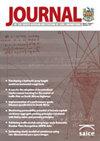Thermal performance of cavities in 3DPC building façades
IF 0.6
4区 工程技术
Q4 ENGINEERING, CIVIL
Journal of the South African Institution of Civil Engineering
Pub Date : 2023-10-04
DOI:10.17159/2309-8775/2023/v65n3a4
引用次数: 0
Abstract
In the quest for sufficient and comfortable housing in South Africa, attention to building orientation and thermal transmittance principles has significantly improved thermal performance in local houses. Thermal simulation and monitoring of houses in the Joe Slovo Phase Three development in Cape Town confirms improved performance by solar radiation blockage and shading. This paper simulates the thermal performance of a housing unit in this development. The house was instrumented with thermocouples, and monitored from March to December 2013 by Sustainable Energy Africa in collaboration with the National Department of Human Settlements. Sustainable Energy Africa reported significant improvement when compared to a nearby traditional Reconstruction and Development Programme house that had been monitored during the same period. With the benefit of the monitored thermal data, complete drawings, and specification details of the Joe Slovo Phase Three unit, the current research modelled and calibrated a simulation model in DesignBuilder. DesignBuilder was selected given its accreditation status for Green Star Rating of buildings in South Africa. An additional motivation for investigating this unit was the availability of recorded weather data from the nearby Cape Town International Airport, captured in the DesignBuilder climate data base for 2013, which was assumed relevant in lieu of complete weather station data measured at the location of the housing unit. The study aimed to simulate the monitored temperatures in the house with acceptable agreement, and to investigate further potential improvement in occupant thermal comfort by alternative 3D-printed concrete walling developed by the authors. Systematic finite element analysis (FEA) iteratively solved cavity radiation and convection in wall cavities to calibrate thermal transmittance parameters for DesignBuilder. The FEA results acceptably simulated temperatures monitored in this physical wall experiment. The calibrated DesignBuilder model simulated the indoor temperatures of the monitored house with acceptable agreement, and predicted significant improvement in occupant thermal comfort if the walls were 3D-printed with a particular cross-sectional design.3DPC建筑立面空腔热性能研究
在南非寻求充足和舒适的住房的过程中,对建筑朝向和热透射原则的关注大大改善了当地房屋的热性能。开普敦Joe Slovo三期开发项目的房屋热模拟和监测证实,通过阻挡太阳辐射和遮阳改善了房屋的性能。本文模拟了该开发项目中住宅单元的热性能。2013年3月至12月,该房屋由非洲可持续能源与国家人类住区部合作进行监测。非洲可持续能源报告说,同同期监测的附近传统的重建和发展方案房屋相比,有了很大的改善。利用Joe Slovo三期装置的热监测数据、完整的图纸和规格细节,目前的研究在DesignBuilder中建模并校准了仿真模型。DesignBuilder之所以被选中,是因为它获得了南非建筑绿星评级的认证。调查该单元的另一个动机是来自附近开普敦国际机场的记录天气数据的可用性,这些数据记录在DesignBuilder 2013年的气候数据库中,这些数据被认为是相关的,而不是在住宅单元位置测量的完整气象站数据。该研究旨在以可接受的协议模拟房屋内的监测温度,并通过作者开发的替代3d打印混凝土墙进一步研究居住者热舒适度的潜在改善。系统有限元分析(FEA)迭代求解了壁面腔内的腔辐射和对流,以校准DesignBuilder的热透射参数。有限元分析结果较好地模拟了物理墙实验中监测到的温度。经过校准的DesignBuilder模型模拟了受监测房屋的室内温度,达到了可接受的一致性,并预测如果墙壁采用特定横截面设计的3d打印,则居住者的热舒适度将得到显着改善。
本文章由计算机程序翻译,如有差异,请以英文原文为准。
求助全文
约1分钟内获得全文
求助全文
来源期刊
CiteScore
0.70
自引率
25.00%
发文量
19
审稿时长
>12 weeks
期刊介绍:
The Journal of the South African Institution of Civil Engineering publishes peer reviewed papers on all aspects of Civil Engineering relevant to Africa. It is an open access, ISI accredited journal, providing authoritative information not only on current developments, but also – through its back issues – giving access to data on established practices and the construction of existing infrastructure. It is published quarterly and is controlled by a Journal Editorial Panel.
The forerunner of the South African Institution of Civil Engineering was established in 1903 as a learned society aiming to develop technology and to share knowledge for the development of the day. The minutes of the proceedings of the then Cape Society of Civil Engineers mainly contained technical papers presented at the Society''s meetings. Since then, and throughout its long history, during which time it has undergone several name changes, the organisation has continued to publish technical papers in its monthly publication (magazine), until 1993 when it created a separate journal for the publication of technical papers.

 求助内容:
求助内容: 应助结果提醒方式:
应助结果提醒方式:


